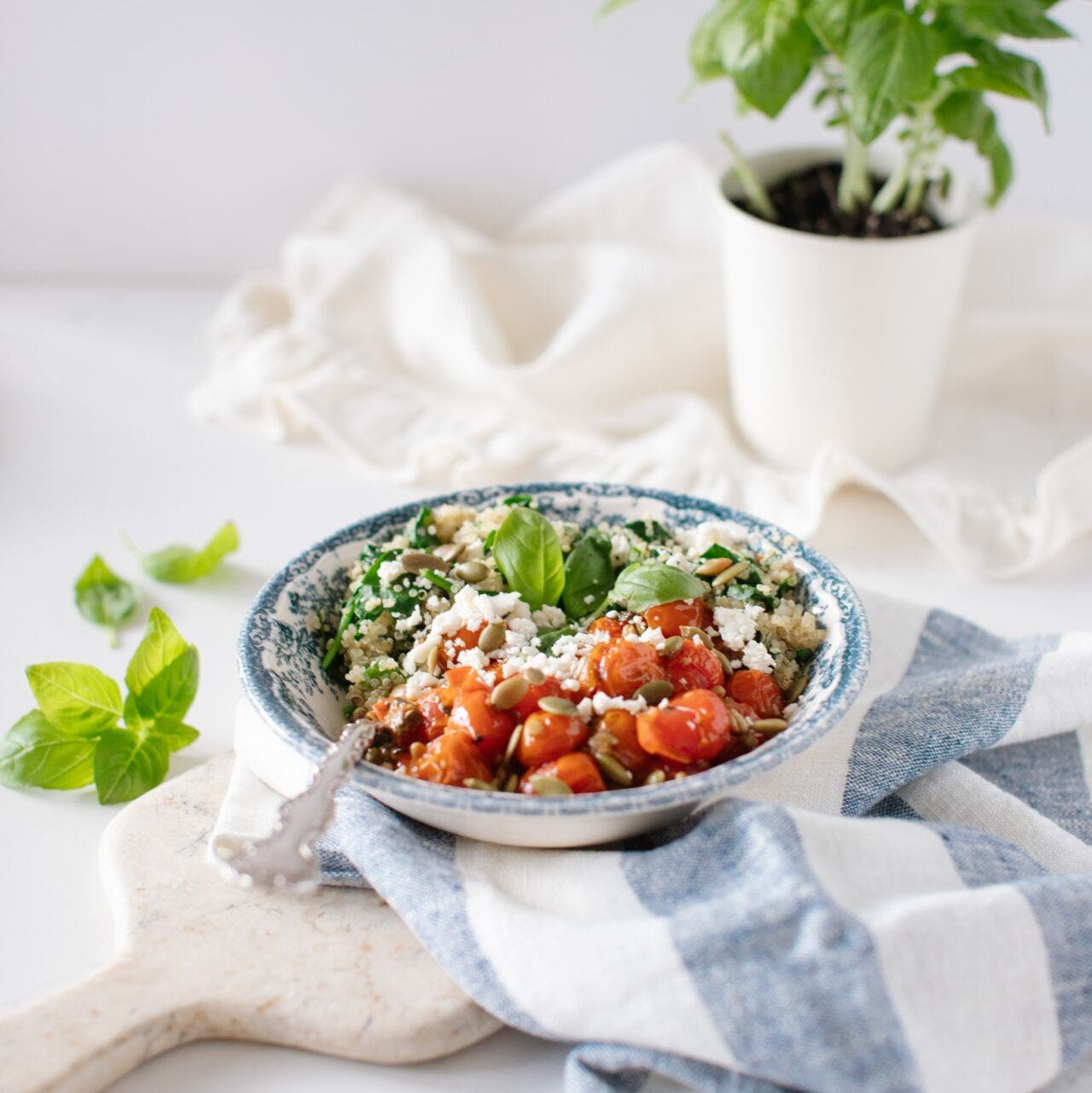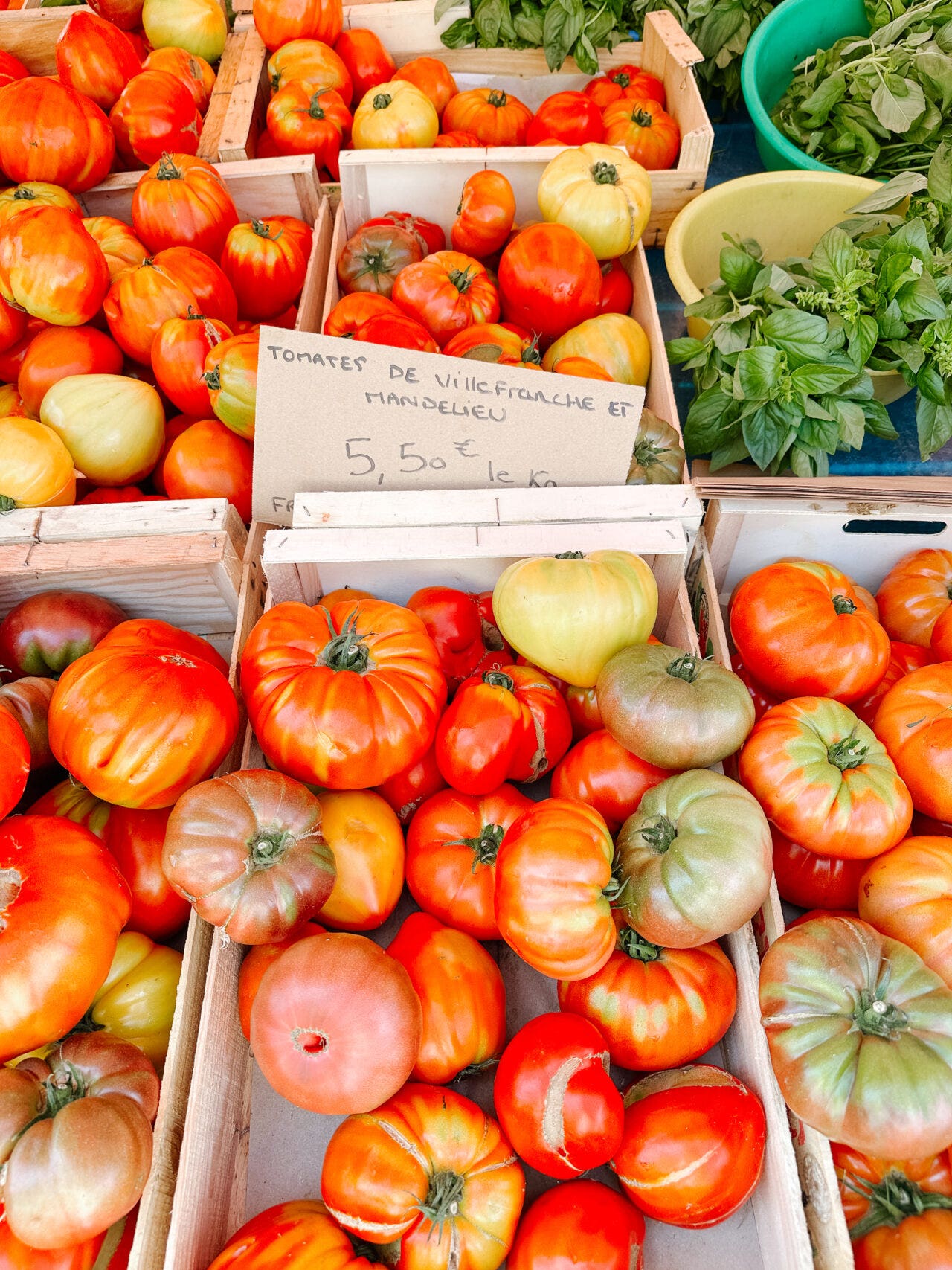Ah, the Mediterranean… imagine sparkling blue waters, rugged cliffs adorned with charming old houses, endless sunshine, and lush groves of olive trees. It’s easy to see why this region makes us want to pack our bags and head straight there! But it’s not just the scenery that pulls us in—it’s the mouthwatering food, too. Think vine-ripened tomatoes drizzled with fragrant olive oil and sprinkled with fresh basil, or lemony salmon topped with dill and feta. Food is at the heart of the Mediterranean lifestyle, so much so that the Mediterranean diet is one of the most well-researched and is often hailed as one of the healthiest eating patterns in the world.
As a dietitian I love the Mediterranean diet for its focus on fresh, seasonal nutrient-rich foods. You’ve probably heard that it promotes health and longevity, but let’s take a deeper dive into what makes this diet so special, what benefits it offers, and how you can bring a little Mediterranean magic into your own meals.

What is the Mediterranean Diet?
The Mediterranean diet is based on the eating habits of countries surrounding the Mediterranean sea like Greece, Italy, and Spain, where people often enjoy long, healthy lives with lower rates of chronic diseases such as heart disease, diabetes, and cancer. Unlike many trendy diets, the Mediterranean way of eating isn’t about quick fixes—it’s a sustainable, long-term lifestyle focused on balance and enjoyment, rather than restriction.
What makes this diet stand out is its emphasis on whole, minimally processed foods: foods that are as close as possible to the way they are grown. Instead of obsessing over calorie counts or eliminating entire food groups, the Mediterranean diet encourages a wide variety of fresh, nutrient-dense foods. It emphasizes healthy fats, lean proteins, fruits, vegetables, and whole grains, while keeping animal products in moderate portions. We move towards our focus, so focus on what to do more (not what to do less).

The Health Benefits of the Mediterranean Diet
Incorporating Mediterranean eating habits into your lifestyle comes with a range of impressive health benefits:
Heart Health: The diet’s focus on healthy fats, fibre, and antioxidant-rich foods supports a healthy heart and may reduce the risk of cardiovascular disease.
Weight Management: The whole, unprocessed foods in this diet are great for weight control, helping you stay full and satisfied while fueling your body with the nutrients it needs.
Cognitive Function: Foods included in the Mediterranean diet may help protect against cognitive decline, making it easier to maintain brain health as we age.
Blood Sugar Regulation: With its whole-food focus, the Mediterranean pattern of eating tends to scale lower on the glycemic index to help stabilize blood sugar levels, which is great for those managing or at risk of diabetes or simply wanting sustained energy levels throughout their day.
In fact, a recent study by Harvard (2024) found that following the Mediterranean diet is associated with a longer life span—this makes sense, given that two of the five global “Blue Zones” (regions where people often live to 100 with low rates of chronic illness) are located in the Mediterranean!
Fundamentals of the Mediterranean Diet
The Mediterranean diet revolves around simple yet powerful principles that guide meal planning:
Healthy Fats: Olive oil is the star here, packed with heart-healthy monounsaturated fats. It’s been shown to lower the risk of heart disease and provide other anti-inflammatory benefits.
Fruits and Vegetables: You’ll find a variety of fresh, seasonal produce in the Mediterranean diet, with favourites like citrus fruits, berries, grapes, pomegranates, leafy greens, tomatoes, olives, eggplant, zucchini and peppers. Collectively, these fruits and vegetables are rich in vitamins, antioxidants and essential nutrients.
Whole Grains: Whole grains like quinoa, barley and oats are staples. These complex carbs are loaded with B-vitamins and fibre and support gut health.
Legumes and Nuts: Beans, lentils, and nuts provide plant-based protein, healthy fats, and fibre.
Fish and Seafood: Fish, particularly fatty fish like salmon is encouraged due to high omega-3 fatty acids, which support both brain function and cardiovascular health.
Limited Red Meat and Dairy: Red meat is eaten sparingly in the Mediterranean diet and dairy is typically consumed in moderation, with a preference for low-fat or fermented options such as yogurt and cheese.
Herbs and Spices: Rather than relying on salt, Mediterranean cooking uses aromatic herbs and spices like garlic, basil, oregano, and rosemary to elevate dishes. These not only add a depth of flavour but also themselves provide anti-inflammatory and antioxidant benefits.

The Mediterranean Lifestyle: Connection
One of the most beautiful aspects of the Mediterranean lifestyle (and my personal favourite) is the emphasis on connection: connection to food, to family, and to our community. Family meals play a central role, bringing people together and fostering deep relationships. Sharing a meal isn’t just about the food; it’s about slowing down, reducing stress by connecting with others, and improving overall well-being.
The Mediterranean way encourages mindfulness around meals—eating slowly, savouring each bite, and truly relishing in the experience. The opposite of how we often eat in North America, behind the wheel of a car or while scrolling on our phone. This ‘slow-food’ way of eating not only aids in digestion but also helps you tune in to your body’s hunger cues and avoid overeating.
Eating seasonally and locally is also a key part of the Mediterranean lifestyle. Not only is it more sustainable and environmentally friendly, but it fosters a sense of connection within communities. It encourages us to appreciate where our food comes from and helps us develop a deeper respect for nature’s rhythms. Such a lovely sentiment!
Mediterranean Recipes: Healthy ‘Fast Food’

Fortunately, the Mediterranean diet is as enjoyable as it is healthy. With its simple yet flavourful ingredients, this way of eating makes it easy to prepare meals that are both satisfying and nourishing. Whether you’re cooking a leisurely Sunday dinner or preparing something quick for a busy weeknight, there are plenty of Mediterranean-inspired recipes that’ll make you look forward to every meal.
That’s where Fraîche Table comes in! If you need some ideas, check out our Recipe Library for Mediterranean-inspired dishes such as:
- Citrus Rosemary Salmon
- Mediterranean Skillet
- Pistachio Orange Overnight Oats
- Sheetpan Shrimp Scampi
- Falafel & Veggie Pita Pockets
The stress of searching for recipes, labouring over grocery lists or panic-resorting to take out is decidedly not a part of the Mediterranean lifestyle: let Fraîche Table make it easier for you to enjoy food that nourishes your body and brings your family together. Click HERE to start a 10-day free trial!

Sources and Further Reading
What Happens to Your Body When You Follow the Mediterranean Diet

